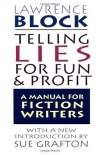Manual For Fiction Writers by Block, Lawrence (classic books to read .TXT) 📗

Book online «Manual For Fiction Writers by Block, Lawrence (classic books to read .TXT) 📗». Author Block, Lawrence
There are a couple of implicit assumptions here, chief among them the notion that an increase in writing speed will not be accompanied by a drop-off in writing quality. And it's quite natural to believe that the opposite is true, that the faster one writes something the more slipshod and imperfectly conceived and developed it is likely to be. Don't you get out of something what you put into it?
I think the question's an interesting one. Joseph Heller's second novel, Something Happened, was some ten years in the writing; would it have been a poorer piece of work had it been accomplished in five? At the other extreme, Voltaire is supposed to have written Candide in three days. Would he have made a better job of it by allowing a full week for its composition?
It's certainly possible to contend that an increase in writing speed can adversely affect the quality of one's work. One might rush through the work before ideas have had a chance to develop. But it is also possible to argue that sometimes a book or story will be better for having been written more rapidly.
I think there's a definite gain in intensity, for one thing. If I write a book in a month, for instance, it's likely to be all of a piece. The way I feel about my characters?and, consequently, the way they feel about things?is likely to remain the same from start to finish. Furthermore, if I write that book in a month it's going to be very much a presence in my mind throughout that month. If the same amount of writing is spread out over a year, it will probably claim a correspondingly smaller portion of each day's conscious and unconscious attention.
Similarly, fast writing helps keep a book from going stale. If a book seems to be taking forever in the writing, I'm likely to be bored by the process of writing it. While it is not necessarily axiomatic that a book which bores its writer will have the same effect on its reader, it's rare that a writer's disenchantment with his work doesn't show up on the printed page one way or another.
This is not to say that the faster a book is written the better it will be. For one thing, there is a trade-off. A gain in intensity may be offset by a loss of that quality that comes of living in and with a book for an extended period of time. If I rush too rapidly through what I'm writing, I don't give myself time to explore its possibilities, time to learn more about its characters. And I find myself in the position of an aggressive general who has outrun his supply lines; by covering literary ground at too swift a pace, I'm unable to replenish the energy required to allow each day's work to be of optimum quality.
How fast is too fast? This is a hard question to answer, because the answer seems to vary not only from one writer to the next but from one book to another.
The fastest book I ever wrote took three writing days. My second daughter had just been born and I thought it would be nice to be able to settle the hospital bill. I accordingly arranged to write an extra book that month for my regular publisher, a soft-core sex novel of the sort I was then doing monthly at a usual pace of ten working days over two weeks. I wrote from nine in the morning until six or seven at night for two days, then worked from nine to three on the third day, and completed a two-hundred-five-page manuscript by that happy hour.
I don't know that the book was any better or any worse than what I generally turned out in those days. I do know that I forgot each scene as I wrote it, that my words seemed to pass onto the page and out of my mind simultaneously, to the point where I could never recall from one page to the next what color hair my characters had, or anything much beyond their names. The names, too, were forgotten within a day of finishing the book, and I now recall nothing whatever about it except the speed of its production. I don't own a copy, and it's not improbable that I could read the thing now without recognizing it.
That book, I would say without hesitation, was written too rapidly.
On the other hand, I wrote a book called Ronald Rabbit Is a Dirty Old Man in four consecutive days, and while nobody ever mistook it for Candide, I think it worked out rather well. The ideas kept coming as fast as I could type and I simply couldn't tear myself away from the book. Another book, Such Men Are Dangerous, took eight or nine days and was similarly written in white heat; a lot of people consider it my strongest novel.
I can't write at that pace any more, not merely because I'm older but because my writing has become more deliberate. Really fast writing demands that one wear blinders like a racehorse; thus attired, one plunges, single-mindedly toward the goal, undistracted by alternative possibilities. There was a time when





Comments (0)